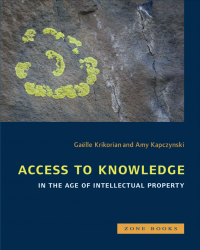
Author : Krikorian, Gaëlle; Kapczynski, Amy
Publishing Date : Mar 20, 2023
A movement emerges to challenge the tightening of intellectual property law around the world.At the end of the twentieth century, intellectual property rights collided with everyday life. Expansive copyright laws and digital rights management technologies sought to shut down new forms of copying and remixing made possible by the Internet. International laws expanding patent rights threatened the lives of millions of people around the world living with HIV/AIDS by limiting their access to cheap generic medicines. For decades, governments have tightened the grip of intellectual property law at the bidding of information industries; but recently, groups have emerged around the world to challenge this wave of enclosure with a new counter-politics of “access to knowledge” or “A2K.” They include software programmers who took to the streets to defeat software patents in Europe, AIDS activists who forced multinational pharmaceutical companies to permit copies of their medicines to be sold in poor countries, subsistence farmers defending their rights to food security or access to agricultural biotechnology, and college students who created a new “free culture” movement to defend the digital commons. Access to Knowledge in the Age of Intellectual Property maps this emerging field of activism as a series of historical moments, strategies, and concepts. It gathers some of the most important thinkers and advocates in the field to make the stakes and strategies at play in this new domain visible and the terms of intellectual property law intelligible in their political implications around the world. A Creative Commons edition of this work will be freely available online.

Author : Correa, Carlos M., Hilty, Reto M.
Publishing Date : Mar 20, 2023
This open access book is the outcome of a Global Forum on Innovation, Intellectual Property and Access to Medicines held in December 2019 at the Max Plank Instititute in Munich, organised by the South Centre and the Max Plank Institute. The academics and experts from international organisations participating have contributed chapters to this book. The book is for policy makers (in Ministries of Health, Ministries of Trade, Ministries of Foreign Affairs, patent offices), but also relevant for academics (law, trade, public health), on the flexibilities available in the Agreement on Trade Related Aspects of Intellectual Property Rights (TRIPS) of the World Trade Organization to promote access to medicines.

Author : Maureen O'Sullivan
Publishing Date : Jun 19, 2019
This book critiques the decision-making process in Article 53(a) of the European Patent Convention. To date, such decisions have been taken at high levels of expertise without much public involvement. The book eschews traditional solutions, such as those found within legislative, judicial and patent office realms and instead develops a radical blueprint for how these decisions can be put to the public. By examining wide-scale models of participatory democracy and deliberation, this book fills a significant gap in the literature. It will be invaluable for patent lawyers, academics, practitioners and intellectual property and patent officials.
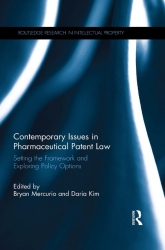
Author : Bryan Mercurio, Daria Kim
Publishing Date : Feb 17, 2017
This collection reflects on contemporary and contentious issues in international rulemaking in regards to pharmaceutical patent law. With chapters from both well-established and rising scholars, the collection contributes to the understanding of the regulatory framework governing pharmaceutical patents as an integrated discipline through the assessment of relevant laws, trends and policy options. Focusing on patent law and related pharmaceutical regulations, the collection addresses the pressing issues governments face in an attempt to resolve policy dilemmas involving competing interests, needs and objectives. The common theme running throughout the collection is the need for policy and law makers to think and act in a systemic manner and to be more reflective and responsive in finding new solutions within and outside the patent system to the long-standing problems as well as emerging challenges
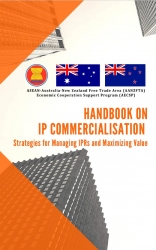
Author : The ASEAN Secretariat
Publishing Date : Mar 12, 2020
This Handbook is designed for business people of ASEAN Member States, Australia and New
Zealand.
In aid of understanding, some examples have been provided, but these are mere illustrations and do
not provide judgment and do not constitute commercial or legal advice. Views or conclusions may
have also been expressed but these should NOT be taken as legal or commercial advice. Any part of
the content of this publication (including images, graphics, trademarks or logos) is only intended for
informational and educational and educational purpose only.
The author and the ASEAN Secretariat have taken due diligence in the preparation of this
publication. However, they shall not be held liable for any omissions or inaccuracies in the content of
this publication. Neither the authors, the ASEAN Secretariat, Australian and New Zealand
Governments accept any liability for any claims, loss or expenses that may arise or arising from use
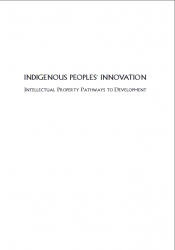
Author : Drahos, Peter; Frankel, Susy
Publishing Date : Mar 22, 2023
Traditional knowledge systems are also innovation systems. This book analyses the relationship between intellectual property and indigenous innovation.
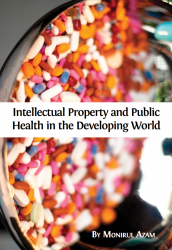
Author : Azam, Monirul
Publishing Date : Mar 20, 2023
"Across the world, developing countries are attempting to balance the international standards of intellectual property concerning pharmaceutical patents against the urgent need for accessible and affordable medicines. In this timely and necessary book, Monirul Azam examines the attempts of several developing countries to walk this fine line. He evaluates the experiences of Brazil, China, India, and South Africa for lessons to guide Bangladesh and developing nations everywhere. Azam's legal expertise, concern for public welfare, and compelling grasp of principal case studies make Intellectual Property and Public Health in the Developing World a definitive work. The developing world is striving to meet the requirements of the World Trade Organization's TRIPS Agreement on intellectual property. This book sets out with lucidity and insight the background of the TRIPS Agreement and its implications for pharmaceutical patents, the consequences for developing countries, and the efforts of certain representative nations to comply with international stipulations while still maintaining local industry and public health. Azam then brings the weight of this research to bear on the particular case of Bangladesh, offering a number of specific policy recommendations for the Bangladeshi government—and for governments the world over. Intellectual Property and Public Health in the Developing World is a must-read for public policy-makers, academics and students, non-governmental organizations, and readers everywhere who are interested in making sure that developing nations meet the health care needs of their people. "
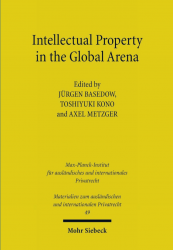
Author : Kono, Toshiyuki; Basedow, Jürgen; Metzger, Axel
Publishing Date : Mar 20, 2023
The private international law of intellectual property is currently much debated both in Europe and abroad. Art. 8 of the Rome II Regulation of 2007, which codifies a territorial approach for the infringement of intellectual property, has provoked an intensive discussion in Europe as to whether the lex loci protection is still appropriate for intellectual property litigation in the age of worldwide networks. A condensed outcome of this debate is summarized in the »Principles for Conflict of Laws in Intellectual Property« (CLIP Principles) drafted by the European Max Planck Group on Conflict of Laws in Intellectual Property (CLIP), published recently in a second preliminary draft. On the international scale, the American Law Institute's »Intellectual Property: Principles Governing Jurisdiction, Choice of Law, and Judgments in Transnational Disputes« of 2007 (ALI Principles) are the focal point of the debate. A Japanese project (»Transparency Proposal«) was finalized in 2009. This volume provides a comparative analysis of the three proposals. It compiles papers presented at an international conference held in Tokyo in May 2009.
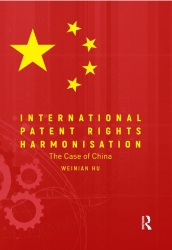
Author : Weinian Hu
Publishing Date : May 08, 2017
With reference to China, this book examines the course of international patent rights harmonisation; its characteristics as well as impediments. It evaluates the case of China’s patent law development over the course of the last three decades by drawing on the most up-to-date Chinese language sources. In the process, the volume focuses on China’s patent legislation, its achievements and weaknesses, as well as the intrinsic limitations, especially as far as enforcement is concerned. The author pays close attention to the unique societal background in China, a country that did not provide constitutional recognition to private property rights until 2004 and where a property law entered into force as late as 2013, 30 years after the first promulgation of the patent law.
Global trade policy makers, IP professionals and businesses will benefit from the insights presented by the chapters as they will help them to appreciate the achievements and the controversies pursuant to China’s efforts in patent protection. While serving as a useful case study for countries seeking to leverage patent protection as a driver for economic development, the book will equally facilitate Chinese legislature to reflect on its patent legislation development, specifically on legislative policy choices.
An additional analytical strength of the volume is that it compares the Chinese patent legislation with the American Invents Act and the European Patent Convention. It discovers the differences between the three patent legislations by using the minimum patent protection standards set down by the TRIPS Agreement as the benchmark. The results of the comparisons suggest that China has successfully harmonised its patent legislation with the global patent protection system, and often opts for higher patent protection standards. The book also considers whether China could learn lessons from Japan and India in their respective patent legislation and policy choices.
With China undertaking a fourth patent law amendment, the provisions contained in the second draft of the Patent Law 2015, which was published in December 2015, are included in the analysis.
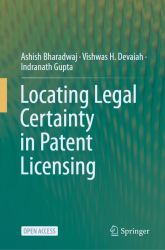
Author : Bharadwaj, Ashish Devaiah, Vishwas H. Gupta, Indranath
Publishing Date : May 15, 2023
This open access book presents global perspectives and developments within the information and communication technology (ICT) sector, and discusses the bearing they have on policy initiatives that are relevant to the larger digital technology and communications industry. Drawing on key developments in India, the USA, UK, EU, and China, it explores whether key jurisdictions need to adopt a different legal and policy approach to address the unique concerns that have emerged within the technology-intensive industries. The book also examines the latest law and policy debates surrounding patents and competition in these regions. Initiating a multi-faceted discussion, the book enables readers to gain a comprehensive understanding of complex legal and policy issues that are beginning to emerge around the globe.
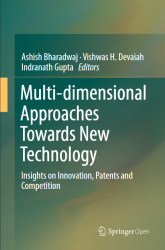
Author : Bharadwaj, Ashish
Publishing Date : May 15, 2023
This open access edited book captures the complexities and conflicts arising at the interface of intellectual property rights (IPR) and competition law. To do so, it discusses four specific themes: (a) policies governing functioning of standard setting organizations (SSOs), transparency and incentivising future innovation; (b) issue of royalties for standard essential patents (SEPs) and related disputes; (c) due process principles, procedural fairness and best practices in competition law; and (d) coherence of patent policies and consonance with competition law to support innovation in new technologies. Many countries have formulated policies and re-oriented their economies to foster technological innovation as it is seen as a major source of economic growth. At the same time, there have been tensions between patent laws and competition laws, despite the fact that both are intended to enhance consumer welfare. In this regard, licensing of SEPs has been debated extensively, although in most instances, innovators and implementers successfully negotiate licensing of SEPs. However, there have been instances where disagreements on royalty base and royalty rates, terms of licensing, bundling of patents in licenses, pooling of licenses have arisen, and this has resulted in a surge of litigation in various jurisdictions and also drawn the attention of competition/anti-trust regulators. Further, a lingering lack of consensus among scholars, industry experts and regulators regarding solutions and techniques that are apposite in these matters across jurisdictions has added to the confusion. This book looks at the processes adopted by the competition/anti-trust regulators to apply the principles of due process and procedural fairness in investigating abuse of dominance cases against innovators.
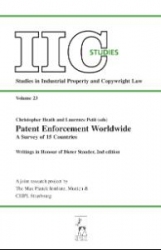
Author : Christopher Heath and Laurence Petit (eds)
Publishing Date : Sep 24, 2014
This book consists of a series of reports in which expert patent attorneys describe the patent infringement procedures in their jurisdiction. Since the first edition of this book was published in 2000, developments in the field of patent enforcement have been significant, requiring a major rewriting of all the seven original contributions (the UK, Germany, France, the Netherlands, Italy, Japan and the US). For this second edition, another eight countries have been included: Poland, the Czech Republic, Hungary, China, Korea, Argentina, Brazil, and Switzerland. There is also a new chapter by Dieter Stauder on European issues of patent enforcement: cross-border litigation, cross-border assistance in obtaining evidence, and the new European Enforcement Directive.
123NextLast
